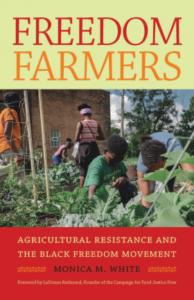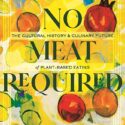Books
Real Food Reads Book Club
Freedom Farmers: Agricultural Resistance and the Black Freedom Movement
In May 1967, internationally renowned activist Fannie Lou Hamer purchased forty acres of land in the Mississippi Delta, launching the Freedom Farms Cooperative (FFC). A community-based rural and economic development project, FFC would grow to over 600 acres, offering a means for local sharecroppers, tenant farmers, and domestic workers to pursue community wellness, self-reliance, and political resistance. Life on the cooperative farm presented an alternative to the second wave of northern migration by African Americans–an opportunity to stay in the South, live off the land, and create a healthy community based upon building an alternative food system as a cooperative and collective effort.
Freedom Farmers expands the historical narrative of the black freedom struggle to embrace the work, roles, and contributions of southern black farmers and the organizations they formed. Whereas existing scholarship generally views agriculture as a site of oppression and exploitation of black people, this book reveals agriculture as a site of resistance and provides a historical foundation that adds meaning and context to current conversations around the resurgence of food justice/sovereignty movements in urban spaces like Detroit, Chicago, Milwaukee, New York City, and New Orleans.
Praise for Freedom Farmers
“Freedom Farmers is an incredible love letter helping Black people return to and reclaim our true agrarian, radical, collective selves. Through this important book, Dr. White brilliantly disrupts the disempowering narrative that Black communities have a painful relationship with farming and land. While Black people have suffered tremendously via exploited labor and the violence of slavery in this country, that is not the summation of our history with land. Dr. White documents important historical lessons for us and shows us what we’ve known and at times forgotten–that the land both heals and frees us. This book is an urgent reminder and an absolute must read for all of us.”
–Dara Cooper, National Black Food and Justice Alliance
“Meticulously researched, trenchantly analyzed, and engagingly written, this book brings to life the culture, the theorists, the scientists, the farmers, and the organizers that have kept agriculture at the center of African American emancipation, civil rights, and present-day movements for human rights and self-determination. From a rising activist-scholar, a visionary book of remembrance and hope.”
–Eric Holt-Giménez, executive director of Food First
“A refreshing and potentially paradigm-shifting study, combining narrative and an interdisciplinary methodology that draws on archival research and ethnography. It moves the African American agrarian experience into the twentieth century, reconceptualizing it, not just as an experience of oppression, but as a strategic approach to black liberation.”
–Sundiata Cha-Jua, University of Illinois
About the Author
 Dr. Monica M. White teaches courses in environmental justice, urban agriculture and community food systems at the University of Wisconsin-Madison. She is the first African American woman to earn tenure in both the College of Agricultural Life Sciences and the Gaylord Nelson Institute for Environmental Studies. Her research investigates communities of color and grassroots organizations engaged in the development of sustainable, community food systems as a strategy to respond to issues of hunger and food inaccessibility. She has presented widely on these subjects, from the University of Western Cape in South Africa to UC Berkeley to the Detroit Public Library.
Dr. Monica M. White teaches courses in environmental justice, urban agriculture and community food systems at the University of Wisconsin-Madison. She is the first African American woman to earn tenure in both the College of Agricultural Life Sciences and the Gaylord Nelson Institute for Environmental Studies. Her research investigates communities of color and grassroots organizations engaged in the development of sustainable, community food systems as a strategy to respond to issues of hunger and food inaccessibility. She has presented widely on these subjects, from the University of Western Cape in South Africa to UC Berkeley to the Detroit Public Library.

 Dr. Monica M. White teaches courses in environmental justice, urban agriculture and community food systems at the University of Wisconsin-Madison. She is the first African American woman to earn tenure in both the College of Agricultural Life Sciences and the Gaylord Nelson Institute for Environmental Studies. Her research investigates communities of color and grassroots organizations engaged in the development of sustainable, community food systems as a strategy to respond to issues of hunger and food inaccessibility. She has presented widely on these subjects, from the University of Western Cape in South Africa to UC Berkeley to the Detroit Public Library.
Dr. Monica M. White teaches courses in environmental justice, urban agriculture and community food systems at the University of Wisconsin-Madison. She is the first African American woman to earn tenure in both the College of Agricultural Life Sciences and the Gaylord Nelson Institute for Environmental Studies. Her research investigates communities of color and grassroots organizations engaged in the development of sustainable, community food systems as a strategy to respond to issues of hunger and food inaccessibility. She has presented widely on these subjects, from the University of Western Cape in South Africa to UC Berkeley to the Detroit Public Library. 


